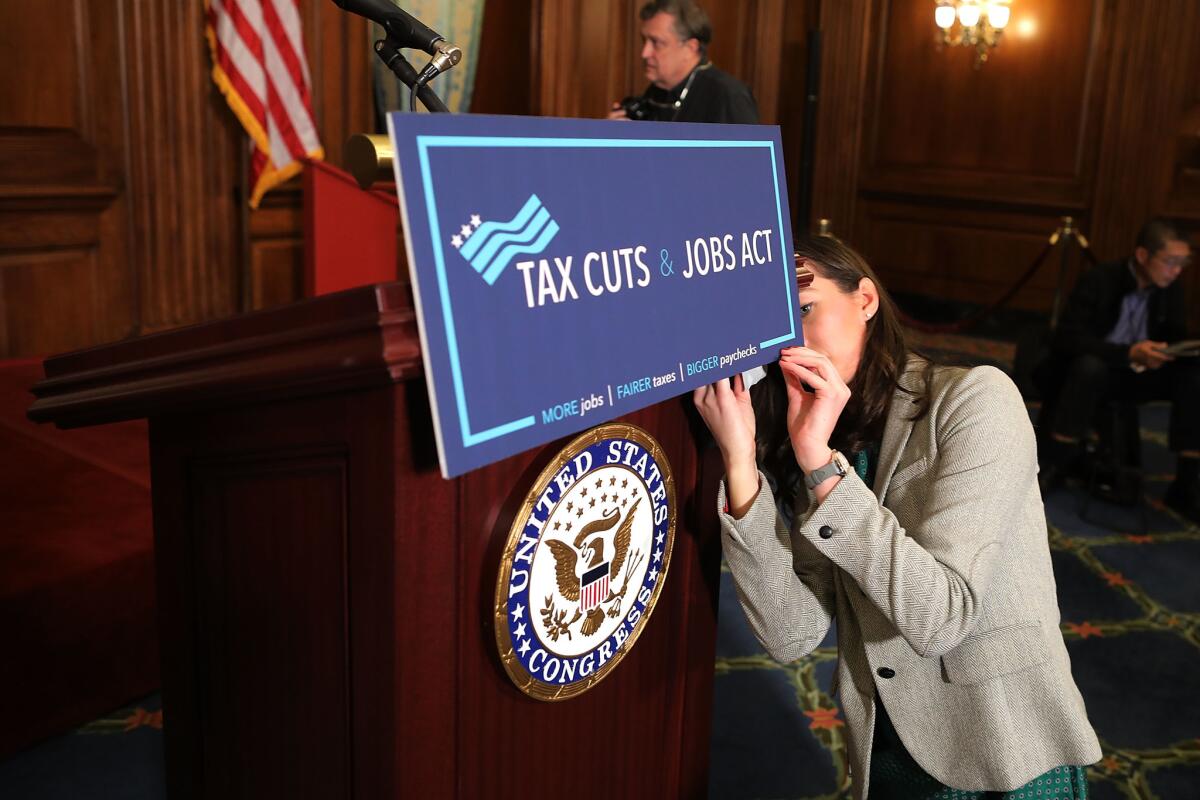The Tax Cuts and Jobs Act was wrongheaded from Day 1. It should be rethought

- Share via
During the first two debates, it was not always easy to parse candidates’ detailed views on tax policy, but two points were clear. First, the deeply unpopular Tax Cuts and Jobs Act remains unloved and has been difficult for Trump to run on. Second, Biden’s tax plan raises taxes only on the rich and corporations, but debate moderators — like many observers — wondered if it is wise to raise any taxes during a recession.
Our economy has been ravaged by the pandemic. However, revoking the parts of the Tax Cuts and Jobs Act that provided large tax cuts for the rich, while providing crucial tax support for those who are hurting, could stimulate the economy. Some tax increases make sense, even during a recession.
The act was wrongheaded from the day it became law in late 2017, and its provisions should be rethought.
The wildly optimistic promises of $4,000 to $9,000 in household wage gains have gone unfulfilled, and the surge in capital investment that was supposed to fuel these gains didn’t materialize. The enacted tax cuts were sharply tilted toward taxpayers at the top, and the act exacerbated offshoring while not solving the problem of profit shifting to tax havens. The imagined boom in economic growth never arrived, and the U.S. was left with about $2 trillion in additional deficits.
The act’s tax cuts should be revoked for the richest Americans, those inheriting wealth and profitable corporations, while groundwork is laid for a continued rethinking of the U.S. tax code. However, the wealthy interests that favored the legislation are likely to bitterly resist. They will make the seemingly plausible argument that raising taxes during a recession will damage the economy.
But will it? Although indiscriminate tax increases are a bad idea, overturning the excesses of the Tax Cuts and Jobs Act could actually stimulate our economy, while improving tax policy.
It is well-known that the rich consume less of their income than do the poor. Recent evidence suggests that the marginal propensity to consume — the fraction of additional income spent — for poor-wealth households is 10 times that of high-wealth households. For example, consider a proposal that raises taxes on the rich, but uses that same revenue to expand the child tax credit, making it refundable for low-income households. Those receiving the extra child tax credits will spend more of the additional dollars than if the money stayed in the hands of the rich, causing aggregate spending to increase. And beyond that, vital tax relief will be provided to America’s most vulnerable families.
In addition, some taxes are already built to be highly counter-cyclical, automatically falling when the economy is weak. For example, raising the tax rate on corporate profits is perfectly reasonable during a recession. Corporate taxes are paid only by profitable corporations, and for those without profits, any percent of zero is zero. Also, many companies can carry forward losses to offset taxes in future years. However, companies profiting in the current environment, such as Amazon or Peloton, can reasonably be expected to contribute a share of their pandemic profits in tax payments.
The corporate tax, when it does fall on profitable companies, mostly falls on the excess profits they earn from market power or other factors (due to the dominance of large companies in markets with little competition, luck or risk-taking), not the normal return on capital investment. Treasury economists calculated that such excess profits made up more than 75% of the corporate tax base by 2013. A higher corporate tax rate can rein in market power and promote a fairer economy.
Will a corporate tax increase reduce stock market prices for a bit? It might, as stock prices reflect the after-tax value of companies’ future profits. Still, as recent data have made only too clear, Wall Street and Main Street are not the same place. Soaring stock market prices provide little solace to the millions who have lost their jobs. Focusing solely on short-term stock prices risks ignoring the fundamentals that are far more important for American business success: well-educated workers, strong institutions, public health, reliable infrastructure, and a society that is open to the talents and markets of the world.
Many tax increases will have little effect on the incentives that drive economic growth. For example, we can make the tax code fairer by undoing estate tax cuts that benefit only the top one-fifth of 1% of households, without discouraging spending. Likewise, more and better tax enforcement can raise revenues, increase fairness and improve taxpayer morale without requiring higher tax rates or reducing the incentive to work or save. The case for closing loopholes is similar.
In short, details matter. It is simply not true that any tax increase is bad during a recession. Undoing tax cuts for the well-off, and pairing that with increased resources for people who are hurting, boosts the economy. And while deficit-spending is easily justified by today’s low interest rates and our struggling economy, that doesn’t weaken the logic of these trade-offs.
The debts we are willing to assume do not nullify the case for reprioritizing our tax code, moving tax cuts away from those who do not need them, and instead rewarding work and helping families through expansions of the earned income tax credit and the child tax credit. The tax code reflects our values, and changes in our tax laws can help build more inclusive economic growth.
The notion that taxes can never be raised during a recession is simple fearmongering. Raising taxes on the wealthy and large corporations can be smart economics, even when the economy is weak.
Kimberly Clausing is a professor of economics at Reed College and the author of “Open: The Progressive Case for Free Trade, Immigration, and Global Capital.”
More to Read
A cure for the common opinion
Get thought-provoking perspectives with our weekly newsletter.
You may occasionally receive promotional content from the Los Angeles Times.









